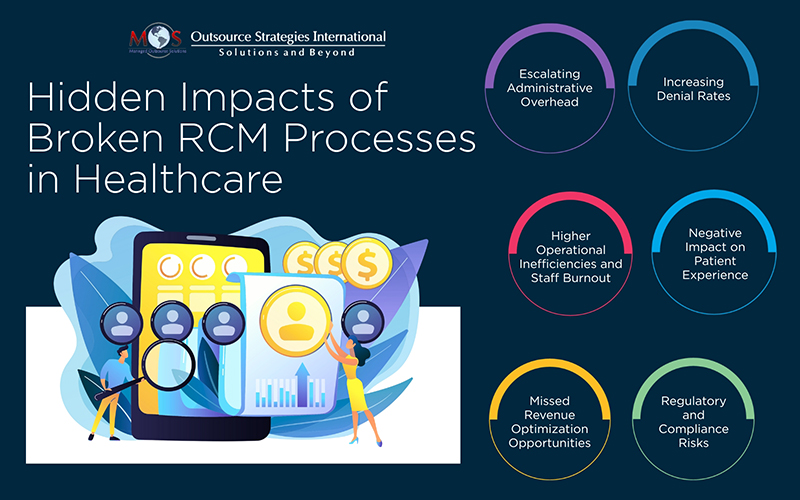Consider this scenario: a medical facility has been grappling with flawed revenue cycle management (RCM) throughout the past year. The administrative department is overloaded with manual paperwork, insurance claims are frequently denied due to coding errors, and patients receive surprise bills weeks later, prompting complaints and late payments. These healthcare billing inefficiencies lead to drained resources, create ineffective processes, and cause financial distress for both providers and patients.
Neglecting these hidden consequences of poor RCM in healthcare can ultimately create a cycle of financial instability that affects every aspect of operations. Fragmented RCM processes directly contribute to high medical claim denial rates, mounting debt, regulatory scrutiny, and reputational damage for practices. Partnering with specialized automation and AI-driven healthcare revenue cycle management services can help practices streamline billing, reduce errors, and secure consistent cash flow.
Key Factors to Assess Efficiency of RCM Practices
To evaluate the effectiveness of revenue cycle management, healthcare providers must look beyond surface-level metrics. By analyzing operational, financial, and patient-centric practices, providers can better understand the true impact of their RCM processes. Some key areas to assess include:
- Claims accuracy and denial rates – Monitor the frequency of coding errors, rejected claims, and re-submissions. Denial rates above 5% to 10% indicate inefficiencies in billing, coding, or documentation processes.
- Time to payment – Calculate the days spent in accounts receivable to measure the average duration between care delivery and payment receipt. Extended A/R periods often point to gaps in claims processing, follow-ups, or insurance verification.
- Patient billing experience – Assess patient satisfaction regarding billing clarity, reimbursement transparency, and communication about financial responsibility. Confusing invoices or unexpected charges can reduce trust and delay payments.
- Administrative overhead costs– Evaluate the operational cost required to collect revenue relative to total revenue generation of the practice. A high ratio signals resource-heavy processes, billing inefficiency, revenue leakage, and missed opportunities for practice growth.
- Staff productivity – Review staff time spent on manual paperwork, follow-ups, and error corrections. Overburdened teams often reflect suboptimal RCM workflows.
By systematically assessing these factors, healthcare providers can identify weak points in their RCM processes and implement corrective actions.
Uncovering the Hidden Costs of Poor Revenue Cycle Management in Healthcare
Understanding hidden costs of faulty processes within the revenue cycle is crucial to resolve gaps in the administrative system, optimize operations, and maximize cash flow. The impact of a fragmented system runs deep, affecting both day-to-day operations and financial stability in medical practices. Poor RCM not only leads to missed revenue opportunities but also lowers patient satisfaction and creates operational bottlenecks that compound over time. These hidden consequences can create long-term instability, ultimately compromising a practice’s ability to deliver consistent, high-quality care.
- Escalating Administrative Overhead
In a medical practice, the RCM system works across both front-end and back-end activities of the billing process. Even minor inefficiencies between these areas can cause data inaccuracies, creating costly healthcare reimbursement delays. Extended payment cycles disrupt cash flow, making it difficult to cover payroll, operational costs, and essential investments. As a result, facilities may be forced to divert resources from critical tasks or incur additional expenses, such as interest charges to bridge these gaps.
- Increasing Denial Rates
Inconsistent documentation, coding, and billing practices often lead to errors that go undetected, resulting in denials from insurers. According to a report by the American Hospital Association, nearly 15% of all initial claims submitted to private payers are denied, including many that were approved during the prior authorization process. Denial rates are also significant for other payer types, with 15.7% of Medicare Advantage claims and 13.9% of commercial claims initially denied.
These denials frequently arise from preventable mistakes such as inaccurate diagnosis codes, missing prior approvals, and outdated insurance information. Resolving them creates administrative burden, as staff must invest time and resources to identify root cause, rectify mistakes, and resubmit claims. Ultimately, repeated denials strain staff and tarnish the practice’s reputation with insurance companies.
- Higher Operational Inefficiencies and Staff Burnout
Older RCM systems slow healthcare data entry, claims processing, and reconciliation of accounts, keeping staff bogged down in manual administrative tasks. This increases workload as employees dedicate more time and effort to follow-ups, claim corrections, and appeals. Repetitive, error-prone processes create bottlenecks in daily operations, reducing overall productivity and profitability.
Over time, frustrated employees may leave as added pressure contributes to burnout and job dissatisfaction. High turnover rates disrupt workflow continuity and organizational stability as managers are forced to divert resources to constant hiring and training processes.
- Negative Impact on Patient Experience
Inefficient RCM affects patients directly through delayed invoices, confusing statements, and unexpected out-of-pocket charges. Negative experience related to financial obligations can frustrate patients, erode trust, and delay patient payment collections. Dissatisfied patients may file complaints, post negative reviews, and seek care elsewhere. This not only amplifies patient attrition rate but also impacts patient retention and referral rates. Over time, repeated billing errors can damage a practice’s reputation, reduce revenue collection, and weaken competitive position.
- Missed Revenue Optimization Opportunities
Outdated RCM system doesn’t just lose existing revenue but also prevents practices from earning potential revenue gains. Without accurate analytics and proactive monitoring, data-driven improvementssuch as optimized coding and denial trend analysis for growth opportunities go unnoticed. Maintaining and running legacy RCM systems is also expensive in the long run as frequent repairs, patches, and manual adjustments are frequently required.
- Regulatory and Compliance Risks
Persistent errors in coding and billing processes can trigger audits and penalties from regulatory bodies. Healthcare regulations are constantly evolving, and poorly managed RCM increases the risk of non-compliance with laws, payer requirements, and reporting standards. Beyond financial penalties, regulatory scrutiny can damage credibility with insurers and governing authorities, putting practices at healthcare compliance risks, such as losing accreditation or licensure. Addressing compliance issues requires additional time and resources, diverting attention from patient care and operational priorities.

Why Strategic RCM Collaboration is a Smarter Choice
Modern healthcare organizations are increasingly turning to specialized RCM service providers to overcome inefficiencies and hidden costs in managing RCM systems internally. By partnering with medical RCM services, healthcare providers can streamline administrative processes, enhance compliance, and secure full reimbursement. This transforms a disjointed RCM system into a cohesive, unified platform well-equipped to navigate the complexities of the billing process. Here are the top reasons to work with professional RCM experts:
- Cost-savings – External partners reduce administrative overhead by eliminating the need for costly in-house RCM system tools, upgrades, and maintenance.
- Faster reimbursements – Knowledgeable RCM specialists minimize claim denials, accelerate payments, and handle timely resubmissions and appeals, strengthening cash flow and financial predictability.
- Enhanced patient trust – Improved billing transparency and communication foster stronger patient relationships, leading to higher satisfaction and retention.
- Improved compliance – Experienced teams mitigate compliance risks through accurate coding, documentation, and staying current with changing healthcare regulations.
In an increasingly complex healthcare landscape, strategic collaborations for RCM management are more than just an operational upgrade – it’s a proactive step toward financial stability. By leveraging technology-enabled, AI-driven medical billing and coding solutions, practices can unlock efficiency, boost revenue, and focus on building stronger patient relationships while ensuring sustainable growth.
Transform your revenue cycle and boost cash flow to your practice!




